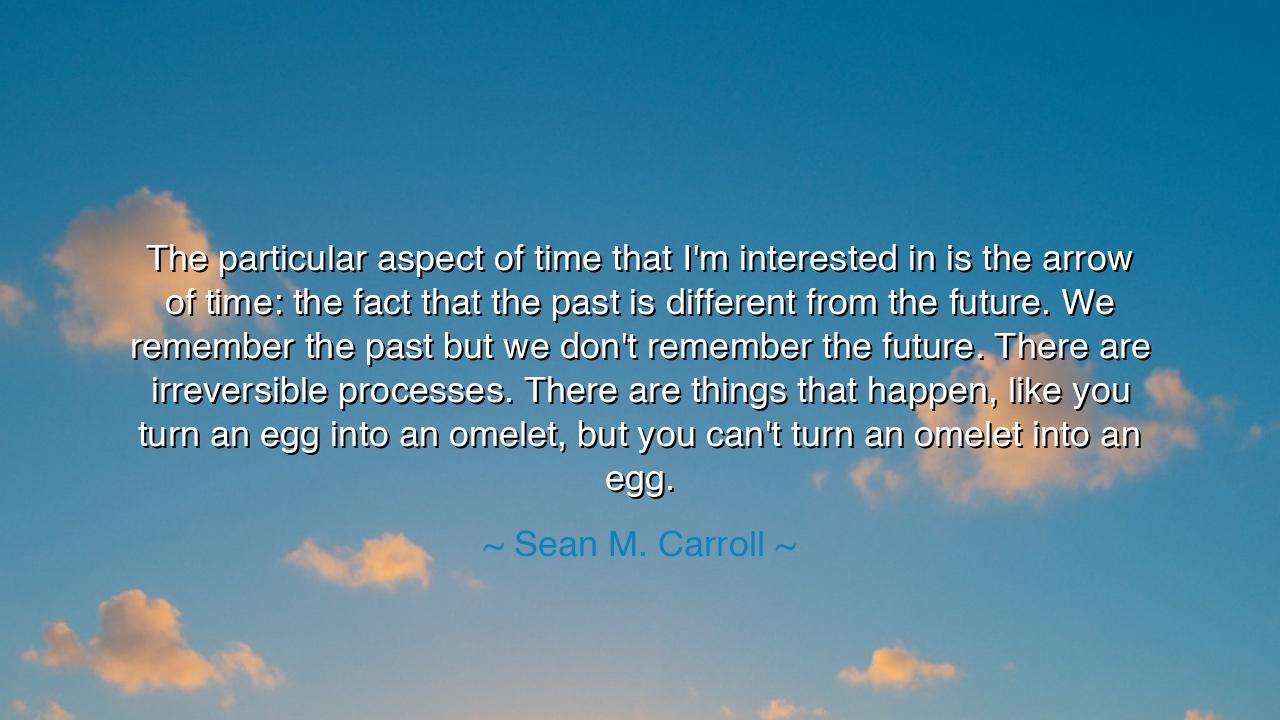
The particular aspect of time that I'm interested in is the arrow
The particular aspect of time that I'm interested in is the arrow of time: the fact that the past is different from the future. We remember the past but we don't remember the future. There are irreversible processes. There are things that happen, like you turn an egg into an omelet, but you can't turn an omelet into an egg.






In the grand tapestry of existence, the mystery of time is one of the deepest and most profound truths that humans have sought to understand. Sean M. Carroll’s words, “The particular aspect of time that I'm interested in is the arrow of time: the fact that the past is different from the future. We remember the past but we don't remember the future. There are irreversible processes. There are things that happen, like you turn an egg into an omelet, but you can't turn an omelet into an egg,” speak to the very essence of what it means to live within the flow of time. Time, like a river, moves in one direction, carrying with it the past that we cannot return to and the future that we cannot know. Carroll’s focus on the arrow of time highlights the irreversibility of the processes that shape our lives, and the tension between memory and anticipation—between what has already been and what is yet to come.
The ancient Greeks were no strangers to the contemplation of time, especially the philosophers who pondered the nature of change and eternity. Heraclitus, one of the great thinkers of antiquity, famously declared that “you cannot step into the same river twice”, symbolizing the constant flux of life and the inevitability of change. For Heraclitus, time was a river that could not be reversed, a force that carried all things forward, without the possibility of returning to the way things were. Carroll’s reflection on time aligns with this ancient wisdom: the past is fixed, while the future remains beyond our grasp. Just as the river of time flows forward, so too does the arrow of time, moving inevitably from cause to effect, from past to future.
The Greeks also grappled with the idea of irreversibility in nature. In Aristotle’s work, he discussed the idea of causality—the understanding that things happen for specific reasons and that once an action has occurred, it cannot be undone. The analogy of turning an egg into an omelet reflects this notion. Once the egg is transformed through heat and process, it becomes something else—an omelet. The transformation is permanent, a reflection of how time works: the past, once lived, cannot be undone, and the future remains a series of possibilities yet to unfold. This is the arrow of time, where the flow of events follows a singular direction, and actions, once taken, cannot be reversed.
This idea of irreversible processes is not only a concept of ancient philosophy but also an observation deeply embedded in the fabric of nature. Consider the aging of a tree: once the seed is planted and it begins to grow, the process cannot be undone. Over the years, it will bloom, mature, and eventually wither. The ringed structure within its trunk is a record of time, telling the story of its growth and decline. Once it has lived its cycle, it cannot be made young again. This irreversibility is the essence of time itself—a force that shapes all life, moving inexorably forward, shaping every action and every being within its grasp.
The same holds true in the realm of human history. Empires rise, and they fall; civilizations emerge, and they disappear. The history of the Roman Empire, for instance, is a story of rise and decline—once a mighty civilization that controlled vast swathes of the world, but eventually crumbled under its own weight. No matter how much one might wish to turn back time, the events that led to its downfall cannot be undone. The mistakes made, the wars fought, and the decisions taken were all part of the irrevocable march of time. This is the great lesson of the arrow of time—we must move forward, learn from the past, and shape a future that avoids repeating the errors of history.
Carroll’s reflection brings us to a profound truth about our own lives: while we cannot change the past, we hold in our hands the ability to shape the future. It is often said that the present is the only time over which we have control, and the choices we make today will influence the world we live in tomorrow. The arrow of time compels us to move forward, but it also challenges us to be mindful of the irreversible actions we take, for they will forever shape the world we leave behind. Whether in our personal lives or in the wider world, the decisions we make now are part of the unfolding story of time, a story that will echo through the future.
The lesson, then, is this: while we cannot undo the past or control the flow of time, we can live with intention, understanding that the choices we make today will carry forward. Like the ancient philosophers, we must embrace the irreversibility of time and use it to our advantage—learning from the past, shaping the present, and crafting a future that is meaningful and thoughtful. In the arrow of time, we find both our limitations and our potential, for the future is shaped not by the regrets of the past, but by the actions we take right now.






AAdministratorAdministrator
Welcome, honored guests. Please leave a comment, we will respond soon